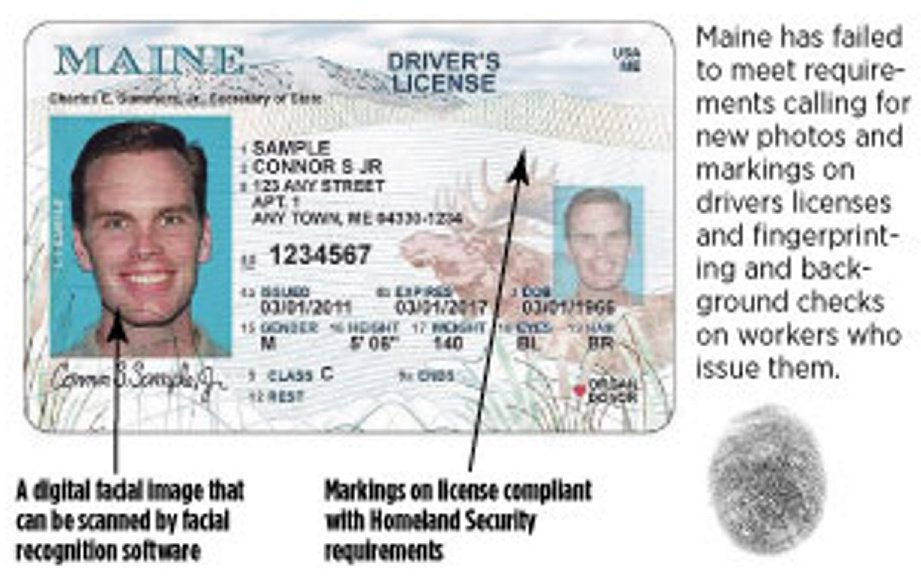Starting in January, the federal government will not accept Maine state IDs or driver’s licenses as identification unless the state complies with a federal law calling for stricter and more uniform ID cards nationwide. And if the state is still out of compliance by 2018, Maine travelers will have to provide an alternative form of identification to board a commercial plane flight.
The Legislature passed a law in 2007 refusing to comply with the federal REAL ID law, and as of Tuesday it appears the state had run out of options to delay implementation.
The U.S. Department of Homeland Security said in a letter to state officials that it won’t grant Maine any more extensions of time to comply with the law, which requires digital photos on licenses, IDs that can be used with facial recognition software, and a database maintained by the state and accessible to federal authorities that includes personal information on residents, among other requirements.
The law also calls for Homeland Security-approved security markings on licenses and IDs and requires the state to collect fingerprints and conduct criminal background checks on state workers involved with issuing licenses or IDs.
“We’re going to have to address this and address it soon,” said state Sen. Bill Diamond, D-Windham, a former Maine secretary of state and one of the few lawmakers who favored compliance with the law in 2007. “This is a game-changer.”
OBJECTIONS OVER PRIVACY CONCERNS
Maine is one of only five states that Homeland Security has deemed noncompliant and have not been granted extensions. The others are Kentucky, Oklahoma, Pennsylvania and South Carolina. The remaining states have either been granted extensions or already have come into compliance.
Initial concerns about the Real ID program united libertarian-minded citizens from both sides of the political spectrum, especially over the portion of the law that creates the federal database of personal information that would be maintained by the state and accessible to federal officials. Maine was the first state to pass a state law refusing to comply with the federal law.
The letter from Homeland Security sent Tuesday said the state has already complied, or taken steps to comply, with many features of the law, but has failed to meet some key components, including requiring all applicants for IDs and driver’s licenses – even those who are denied a license – to have a picture taken that can be run through facial recognition software. The state also has failed to set up a system to retain documents relating to license or ID applications for up to 10 years, and a procedure to fingerprint and do background checks on state employees who work in jobs related to issuing IDs and licenses. Those features were prohibited by the state law.
ANOTHER ISSUE: COST TO THE STATE
The REAL ID law was one of many adopted after the Sept. 11, 2001, terrorist attacks with the goal of improving security in the U.S., including broader surveillance capabilities for intelligence agencies.
Maine had a direct connection to the attacks: Two of the terrorists initially flew out of Portland International Jetport on the morning of Sept. 11, and video cameras showed them going through security with ease before boarding a connecting flight to Boston’s Logan Airport.
Diamond said most of the 2007 debate in the Legislature over barring state officials from complying with the REAL ID law revolved around concerns about the state collecting information that might be used by federal authorities for reasons that weren’t fully spelled out.
But he said the penalty, especially for Maine residents, for continuing to refuse to comply is high.
“We can get into these philosophical debates, but people have to get on airplanes,” he said.
There’s also an issue of cost. In 2014, when federal authorities threatened again to stop giving Maine extensions on compliance – it has received three – Secretary of State Matt Dunlap estimated it could cost up to $1 million for Maine to comply with the law, with ongoing costs for new technologies and training.
The latest review by Homeland Security found that “Maine has not committed to meeting all remaining requirements and has not provided adequate justification for continued noncompliance,” according to the letter from Alan D. Bersin and Philip A. McNamara, both assistant secretaries at the agency.
The immediate impact of Maine’s failure to comply is somewhat limited, but it could be major by 2018. Starting in January 2017, Mainers will not be able to use a state-issued ID or driver’s license to get onto military bases, nuclear plants and some other federal facilities, said Kristin Muszynski, spokeswoman for the Maine Secretary of State’s Office.
But starting in January 2018, the stakes are higher: Maine licenses and IDs would not be acceptable ID to get on a commercial airplane, Muszynski said.
According to Homeland Security, acceptable alternatives would be passports, military IDs or permanent resident cards – documents that many citizens do not have and may have to pay to get.
To come into compliance, and possibly get another extension, Maine legislators would have to repeal the state law and take steps to implement the programs and procedures outlined in the federal law.
State Rep. Andrew McLean, D-Gorham, said he’s not sure that the Homeland Security letter is the final word on whether the federal government will begin enforcing the law in January.
“There’s still some thinking there might be another extension, that the Obama administration might want to push this into the next administration,” said McLean, who has been House chair of the Legislature’s Transportation Committee and hopes to get reappointed to the panel if he’s re-elected next month.
QUICK ACTION MAY BE NEEDED
He said lawmakers will have little time to act if the federal government holds Maine to the deadline.
Legislators will meet in Augusta in December to organize and appoint committees for the next session, but the real work doesn’t start until January. The Homeland Security letter said the law that bars some federal facilities from accepting state IDs and licenses that don’t comply goes into effect Jan. 30, 2017.
McLean, who wasn’t in the Legislature in 2007, said concerns over privacy rights haven’t eased in the nine years since the state refused to comply with many of the REAL ID law’s requirements.
McLean said he’s eager to see whether other states have come up with a way to navigate that issue.
“There are still some privacy concerns with what the federal government has put out,” he said. “I want to talk to experts and see what other solutions are out there to comply with the law, but also reduce or eliminate the privacy concerns.”
Send questions/comments to the editors.





Success. Please wait for the page to reload. If the page does not reload within 5 seconds, please refresh the page.
Enter your email and password to access comments.
Hi, to comment on stories you must . This profile is in addition to your subscription and website login.
Already have a commenting profile? .
Invalid username/password.
Please check your email to confirm and complete your registration.
Only subscribers are eligible to post comments. Please subscribe or login first for digital access. Here’s why.
Use the form below to reset your password. When you've submitted your account email, we will send an email with a reset code.